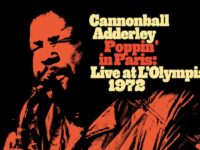by Nick DeRiso
Even a passing fan can purchase with some confidence the touchstone jazz recordings of the last century. But what next? How to explore deeper into the legacy?
SomethingElse! is here to help, with an ongoing guide to what we like to call “if/then” jazz listening …
IF YOU LIKE … Charles Mingus’ The Black Saint and the Sinner Lady
THEN TRY … Duke Ellington – Money Jungle (1962)
A turbulent, challenging mix of new originals and standards like “Solitude” recorded alongside drummer Max Roach and bassist Charles Mingus — then only a year away from issuing “Black Saint.” Highlights include the Monkish “Wig Wise,” a stomping title track (where Duke Ellington makes his own claim to free-playing modernity) and “A Little Max,” which features Ellington and Roach matching each other stride for stride. Mingus, whose peevish attitude apparently gave this session its razor’s edge, takes a notable turn in the walking bass lines of “Caravan.” Ellington is the focus on an eerily beautiful “Fleurette Africaine (African Flower),” but more often is pushed by Mingus into a next-generational bent that still surprises and delights.
IF YOU LIKE … Miles Davis’ Miles Ahead
THEN TRY … Gil Evans – Out of the Cool (1960)
Gil Evans was, of course, an key influence on several high points in the Miles Davis catalog, among them “Miles Ahead” and “Porgy and Bess,” where Evans’ sensitive arrangements provided the space for Davis to move inside and around the Gershwin piece’s theme. Here, Evans (pictured above with Davis) creates the same generous context, all the while neatly juxtaposing a California-smooth band against the complex rhythms of bassist Ron Carter and drummer Elvin Jones. Evans’ flair for pacing, tone and creative construction are perhaps best heard on the lengthy opening cut, “Le Nevada,” which swings for two full minutes before the larger group enters. Other highlights include a lithe reading of George Russell’s angular “Stratusphunk,” an engagingly lyrical “Where Flamingos Fly” and the dark-of-night closer “Sunken Treasure.”
IF YOU LIKE … Julian “Cannonball” Adderley’s Mercy, Mercy, Mercy
THEN TRY … Nat Adderley – Branching Out (1958)
Even then, standing in his brother Julian Adderley‘s shadow, cornetist Nat nevertheless offered a sweet and soulful side — setting us up nicely for his own musical breakthrough to come. Highlights include Thelonious Monk‘s “Well, You Needn’t” as well as Nat’s “Sweet Caroline,” a rootsy gospel turn. Nat finds able support here from tenor saxophone player Johnny Griffin (then coming off “The Congregation,” a similarly gospel-inflected triumph from the year before) along with pianist Gene Harris, bass player Andy Simkins and drummer Bill Dowdy — who found their own measure of fame as The 3 Sounds). Griffin is especially effective while grooving through Adderley’s title track, while Nat takes one of his most sensitive turns on Duke Ellington‘s “Don’t Get Around Much Anymore.” Two years later, Adderley would issue the career-defining “Work Song,” featuring Wes Montgomery, Bobby Timmons, Sam Jones and Percy Heath, forever obscuring this little gem.
IF YOU LIKE … Sonny Rollins’ Alfie
THEN TRY … Oliver Nelson – Blues and the Abstract Truth (1961)
A septet of top-notch players fit snugly into the clever, swinging settings crafted by Oliver Nelson, a nearly forgotten, gone-too-soon arranger. Perhaps best known now, if at all, for his work with Sonny Rollins, Jimmy Smith, Billy Taylor, Wes Montgomery and Buddy Rich in the 1960s, Oliver’s own recordings — among them “Afro/American Sketches” and a sequel called “More Blues and the Abstract Truth,” but with a different lineup — haven’t garnered the same lasting notice. Nuanced performances by trumpeter Freddie Hubbard (at the toppermost of his game), flute player Eric Dolphy and pianist Bill Evans (in his only date with Nelson) goose “Cascades” along, scuff up the hard bop of “Butch and Butch,” and downshift into a gutty blues on “Yearnin.'” None of it tops the quiet majesty of Nelson’s “Stolen Moments,” a cresting point for Nelson’s record — and his career.
IF YOU LIKE … Bill Evans’ Sunday at the Village Vanguard
THEN TRY … Ron Carter/Jim Hall – Telepathy (2001)
For all of bassist Ron Carter‘s many, many, many recordings — it’s been said that the former Miles Davis sideman has appeared in more than 1,000 sessions — this engaging live duet with guitarist Jim Hall is a too-often overlooked opportunity to rediscover the intimacy and daring of Carter’s playing. This shared conversation first began a decade before the two-disc “Telepathy,” which combines a pair of early 1980s releases, “Live at the Village West” and “Telephone.” But there followed a long pause before Carter and Hall returned to a duo format first heard on 1972’s “Alone Together.” They again go by turns from intellectualism (“Summer Night”) to determined interplay (“St. Thomas”) and back again to a gently swaying swing (“Stardust”), recreating a bit of the delicate introspection found on Bill Evans’ heralded Village Vanguard recordings. Too, this pair will occasionally perform against type — with Carter taking the lead, while Hall falls into a rhythmic counterpoint. This reverent hush falls over the crowd, with only the occasional clink of a cash register in the background. That leads to a heartfelt moment with Carter’s “Candlelight,” and another quiet, though nevertheless lasting, revelation.
- Nick DeRiso’s Best of 2015 (Rock + Pop): Death Cab for Cutie, Joe Jackson, Toto + Others - January 18, 2016
- Nick DeRiso’s Best of 2015 (Blues, Jazz + R&B): Boz Scaggs, Gavin Harrison, Alabama Shakes - January 10, 2016
- Nick DeRiso’s Best of 2015 (Reissues + Live): John Oates, Led Zeppelin, Yes, Faces + others - January 7, 2016



